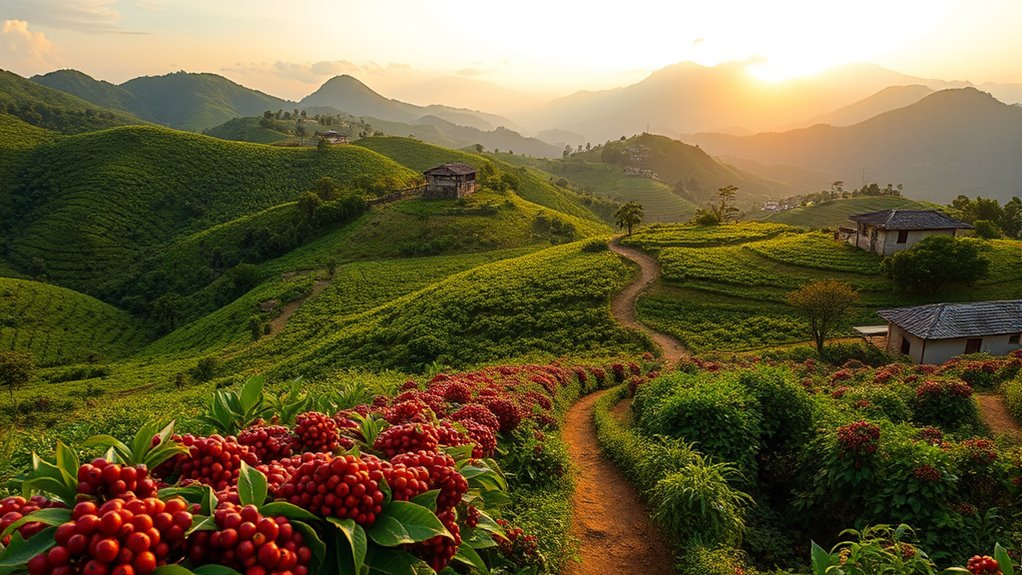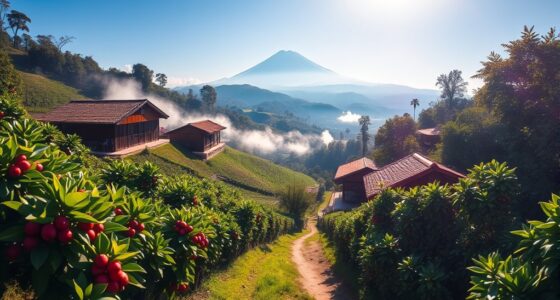Nicaragua’s coffee regions, Nueva Segovia and Matagalpa, offer some of the world’s most distinctive beans thanks to their volcanic soil and ideal climate conditions. Local farmers focus on sustainable practices that protect the environment and enhance bean quality, from eco-friendly farming methods to careful processing techniques. These regions’ commitment to ecological preservation and community engagement creates coffee with rich flavor and unique character. Explore further to discover how these factors shape Nicaragua’s exceptional coffee.
Key Takeaways
- Nueva Segovia and Matagalpa benefit from rich volcanic soils and ideal climates, producing high-quality, flavorful coffee beans.
- Sustainable farming practices in these regions focus on soil health, biodiversity, and eco-friendly methods to ensure long-term coffee quality.
- Coffee processing techniques like washed, natural, and honey methods enhance the unique flavors of Nicaraguan coffee.
- Community involvement and environmental initiatives support reforestation, water conservation, and fair labor practices.
- The regions’ commitment to sustainability and quality elevates Nicaraguan coffee’s reputation for rich aroma and distinct taste.

Nicaragua has become a must-visit destination for coffee enthusiasts, thanks to its rich volcanic soil and ideal climate that produce some of the world’s finest beans. When you explore regions like Nueva Segovia and Matagalpa, you’ll notice that the quality of the coffee starts right from the farm level. Here, sustainable farming practices are at the core of coffee production. Farmers focus on preserving the environment, maintaining biodiversity, and ensuring the health of their soil, which directly impacts the flavor and aroma of their beans. Sustainable farming isn’t just about being eco-friendly; it’s about creating a resilient, high-quality product that benefits both the land and the community.
Nicaragua’s coffee starts with sustainable farms that protect the environment and ensure top-quality beans.
As you tour coffee plantations, you’ll see how coffee processing plays a crucial role in shaping the final product. Coffee processing involves several stages, including pulping, fermentation, washing, and drying. In these regions, many farmers employ traditional methods alongside innovative techniques to extract the best flavors from their beans. For example, some use washed processes to produce clean, bright cups, while others opt for natural or honey processing to add complexity and sweetness. The meticulous attention to each step ensures that the beans retain their unique character, which is a hallmark of Nicaraguan coffee.
You’ll also observe that sustainable farming practices influence coffee processing at every stage. Farmers often use eco-friendly methods, such as composting organic waste to fertilize the soil or employing water-saving techniques during washing. These practices reduce environmental impact and foster a healthier ecosystem. Furthermore, many producers participate in fair trade programs or certifications that promote ethical labor practices, ensuring that workers are treated fairly and communities benefit from coffee sales.
In these regions, the emphasis on sustainability extends beyond farming and processing. The community actively engages in preserving natural resources, whether by reforesting areas or protecting water sources that are essential for processing. This holistic approach guarantees that future generations will continue to enjoy high-quality coffee, grown responsibly. By adopting sustainable farming practices, farmers not only improve the quality of their beans but also contribute to the long-term health of the environment. As you sip your cup, you’ll appreciate not only its rich flavor but also the story of sustainable farming and careful processing behind it. This commitment to quality and environmental stewardship makes Nicaraguan coffee truly distinctive and worth exploring.
Frequently Asked Questions
What Are the Best Coffee Farms to Visit for Tasting Experiences?
You should visit farms like Finca La Bastilla or Finca Cristina, where you can enjoy tasting experiences firsthand. These farms showcase a variety of coffee bean varieties, from Bourbon to Caturra, and demonstrate different harvesting methods, such as selective picking and strip harvesting. You’ll learn how these techniques impact flavor, and get to sample fresh, high-quality coffee directly from the source, making your visit truly memorable.
How Does Altitude Affect Coffee Flavor in These Regions?
Altitude influence markedly impacts the flavor profile of coffee in these regions. As you explore higher elevations, you’ll notice the beans develop more complex, vibrant flavors with brighter acidity. The cooler temperatures slow bean maturation, enhancing their aromatic qualities. So, when visiting farms in Nueva Segovia and Matagalpa, expect altitude to deliver a nuanced, distinctive taste, making your tasting experience richer and more memorable.
Are There Local Coffee Festivals or Events to Attend?
You’ll find lively coffee festivals in Nueva Segovia and Matagalpa, where vibrant displays of coffee bean varieties fill the air with rich aromas. Imagine sipping freshly brewed coffee through various methods, from pour-over to traditional methods, while engaging with local farmers and artisans. These events celebrate Nicaragua’s coffee culture, offering you hands-on experiences and a deeper appreciation for the diverse flavors that make each brew unique.
What Sustainable Practices Are Common Among Farmers Here?
You’ll find that farmers here prioritize sustainable practices like obtaining organic certification, which guarantees eco-friendly farming methods. They also focus on water conservation techniques, such as drip irrigation and rainwater harvesting, to reduce water use and protect local resources. These practices not only promote environmental health but also enhance coffee quality. By supporting farms that embrace organic certification and water conservation, you help sustain the region’s rich coffee tradition.
Can Tourists Participate in Coffee Harvesting or Processing?
Yes, you can participate in coffee harvesting experiences during farm tours. Many coffee farms in Nueva Segovia and Matagalpa welcome tourists to join in the harvesting process, giving you a hands-on understanding of coffee production. These tours often include processing demonstrations, letting you see how beans are sorted and prepared. It’s a great way to connect with local farmers, learn about sustainable practices, and enjoy an authentic coffee farm experience.
Conclusion
Now that you’ve explored the rich coffee regions of Nueva Segovia and Matagalpa, you’re truly in for a treat. Savor the unique flavors and stories behind each cup, knowing you’re tasting more than just coffee—you’re experiencing Nicaragua’s heart. Remember, the early bird catches the worm, so take your time to appreciate every sip and moment. Immerse yourself in this vibrant coffee culture and let it awaken your senses like never before.









